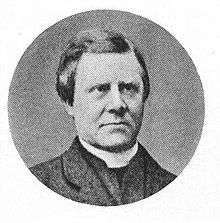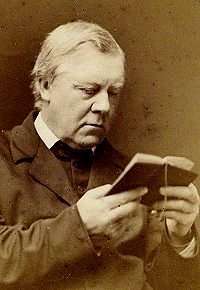Edward Caswall


Edward Caswall, CO, (15 July 1814 – 2 January 1878) was an Anglican clergyman and hymn writer who converted to Roman Catholicism. His more notable hymns include: "Alleluia! Alleluia! Let the Holy Anthem Rise"; "Come, Holy Ghost"; and "Ye Sons and Daughters of the Lord".
Life
He was born at Yateley, Hampshire on 15 July 1814, the son of Rev. R. C. Caswall, sometime Vicar of Yateley, Hampshire.[1]
Caswall was educated at Marlborough Grammar School and Brasenose College, Oxford, where he graduated Bachelor of Arts in 1836 with honours and later proceeded to Master of Arts. In 1838 he was ordained deacon, and in 1839 priest, in the Church of England.[1] He was curate of the Church of St Lawrence at Stratford-sub-Castle, near Salisbury from 1840 to 1847. As curate, he would invite the children who had attended morning services to the parsonage and give them breakfast. On the anniversary on one's baptism, he would give some money to buy clothes.[2] In the summer of 1846 He, his wife, and his brother Tom visited Ireland.
He resigned his curacy and, in January 1847, was received into the Roman Catholic Church by Cardinal Acton at Rome. His brother Tom had converted to Catholicism previously. Caswall's conversion caused an estrangement from some members of his family, including his mother and brother Alfred. His wife, Louisa Stuart Caswall, who had also become a Catholic, died of cholera on September 14, 1849 while they were staying at Torquay.[2] The following year Caswall joined the Oratory of St. Philip Neri under future Cardinal Newman, to whose influence his conversion to Roman Catholicism was due. He was ordained a Catholic priest in 1852. Caswall was delegated the responsibility of establishing the Oratory school, which opened in 1859. He often served as Acting Superior in Newman's absence.
He died at the Oratory, Edgbaston, near Birmingham on 2 January 1878 and was buried at Rednal, near Bromsgrove, Worcestershire.[1]
Works
- Morals from the Churchyard; in a Series of Cheerful Fables Edward Caswall (1838)
- The Art of Pluck: Being a Treatise After the Fashion of Aristotle Edward Caswall (1843)
- Sermons on the seen and unseen Edward Caswall (1846)
- Lyra Catholica: Containing All the Hymns of the Roman Breviary and Missal Edward Caswall (1851)
- The Masque of Mary and Other Poems Edward Caswall (1858)
- Love for Holy Church Edward Caswall (1862)
- A May Pageant and other Poems Edward Caswall (1865)
- Hymns and poems Edward Caswall (1873)
Hymns
He wrote original poems that have survived mainly in Catholic hymnals due to a clear adherence to Catholic doctrine. Caswall is best known for his translations from the Roman Breviary and other Latin sources, which are marked by faithfulness to the original and purity of rhythm. They were published in Lyra Catholica, containing all the breviary and missal hymns (London, 1849); The Masque of Mary (1858); and A May Pageant and other poems (1865). Hymns and Poems (1873) are the three books combined, with many of the hymns rewritten or revised. Some of his translations are used in the Hymns Ancient and Modern.[3] His widely used hymn texts and translations include "See, amid the Winter's Snow", "Alleluia! Alleluia! Let the Holy Anthem Rise"; "Come, Holy Ghost"; "Jesus, the Very Thought of Thee"; "When Morning Gilds the Skies"; "Sleep, Holy Babe" and "Ye Sons and Daughters of the Lord".[4]
References
| Wikimedia Commons has media related to Edward Caswall. |
| Wikisource has original works written by or about: Edward Caswall |
- 1 2 3

- 1 2 De Flon, Nancy Marie. Edward Caswall: Newman's Brother and Friend, Gracewing Publishing, 2005, ISBN 9780852446072
- ↑ H. Eskew, H.T. McElrath, Sing with Understanding: An Introduction to Christian Hymnology, 1980, p. 139
- ↑ "Edward Caswall". Hymnary.org. Retrieved March 18, 2016.
Sources
- Julian, John (June 1907). A Dictionary of Hymnology. London: John Murray. pp. 214–215.
- Bailey, Albert Edward (1950). The Gospel in Hymns. New York: Charles Scribner's sons. pp. 198–199.

External links
- Works by or about Edward Caswall at Internet Archive
- Works by Edward Caswall at LibriVox (public domain audiobooks)
